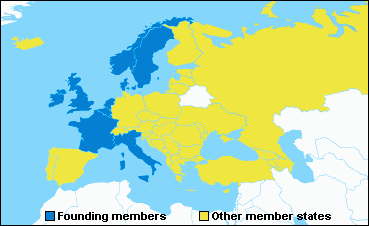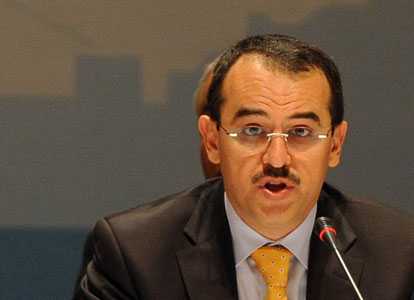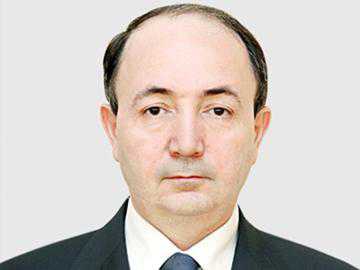
The map above shows the forty-seven nations that make up the membership of the Council of Europe.
The Council of Europe was founded in 1949 with ten original members, and added most of the rest of Western Europe over the next decade or so. The largest jump in membership occurred in the years immediately after the Soviet Empire fell. With the exception of Belarus — which has yet to reach the minimum standards for joining the CoE — any country that is even vaguely European is a member.
And, as you can see, some of them — Azerbaijan, perhaps? Georgia? — are not all that European. Culturally speaking, they are no more European than Iran is.
Here’s a list of all forty-seven member states of the Council of Europe — and quite a cornucopia it is:
| Albania |
|
Germany |
|
Norway |
| Andorra |
|
Greece |
|
Poland |
| Armenia |
|
Hungary |
|
Portugal |
| Austria |
|
Iceland |
|
Romania |
| Azerbaijan |
|
Ireland |
|
Russia |
| Belgium |
|
Italy |
|
San Marino |
| Bosnia & Herzegovina |
|
Latvia |
|
Serbia |
| Bulgaria |
|
Liechtenstein |
|
Slovakia |
| Croatia |
|
Lithuania |
|
Slovenia |
| Cyprus |
|
Luxembourg |
|
Spain |
| Czech Republic |
|
Macedonia |
|
Sweden |
| Denmark |
|
Malta |
|
Switzerland |
| Estonia |
|
Moldova |
|
Turkey |
| Finland |
|
Monaco |
|
Ukraine |
| France |
|
Montenegro |
|
United Kingdom |
| Georgia |
|
Netherlands |
|
|
|
The borders of the entity known as “Europe” make neither geographical nor cultural sense. The idea of Europe as a “continent” is ludicrous: it is bounded by the Norwegian Sea and Atlantic Ocean on the west (except for Iceland), the Barents Sea and the White Sea on the north, the Ural Mountains on the east, and the Mediterranean Sea, the Bosphorus, the Black Sea, and the Caucasus Mountains on the south. Oh, and Turkey gets a special exception: it lies south of the Black Sea and east of the Bosphorus, but since a tiny piece of it (including Constantinople) lies west of the Bosphorus, Turkey gets to be part of “Europe”.
Isn’t that special?
* * * * * * * * * * * * * * *
The Council of Europe was set up as a bulwark against communism, and was part of the larger idea of a “United States of Europe”, which also led in its own good time to the EEC, and later the EU.
The concept of human rights was integral to the CoE from its very inception. Turkey, however, like any other Islamic country, has different ideas than most Europeans about what the term “human rights” means. And, since Turkey has just assumed the rotating chairmanship of the Council of Europe, its version of human rights will gain greater visibility over the next few months.
Turkey has been throwing its diplomatic weight around a lot lately. It has used the Turkish minority in Germany to muscle in on the Merkel government’s integration policy. Its ambassador to Austria has insulted the entire nation of Austria — once again, because of its internal policies concerning the ethnic Turkish minority in Austria.
Outside of Europe, Turkey has been cozying up to China, rattling sabers at Israel, making friends with Hezbollah, and discussing military cooperation with Iran. Considering that Turkey is a full-fledged member of NATO, this should be worrisome to national security officials in certain Western capitals, but so far they seem to be taking these developments with equanimity. Britain and Sweden continue to be champions of Turkish accession to the EU.
Turkey — especially under its current fundamentalist Islamic government — would dearly love to reopen the gateway to Europe that was closed to the Ottomans at Vienna in 1683. The EU, with its corrupt welfare system and absence of internal borders, is the preferred vessel to carry tens of millions more Muslims into Europe. But there’s more than one way to skin a cat, and the Council of Europe affords yet another opportunity to poke a sharp stick into the underbelly of that amorphous region formerly known as Europe.
So how is Turkey going to utilize the chairmanship of the CoE to its advantage? Let’s take a look at a recent article from Hürriyet, which describes the latest opportunities handed to Ankara.
Many thanks to our Flemish correspondent VH for the tip about this article, and for the extra research. All the italics were added by me:
Turkey sets five priorities for Council of Europe
As Turkey takes the reins of one of Europe’s top institutions, the Council of Europe, for a six-month term, representatives outline five main focus areas for their work: reform, reducing workloads, fighting discrimination, empowering institutions and facilitating the EU’s decision to join the European Convention on Human Rights
On taking the chairmanship of the Strasbourg-based Council of Europe for six months, Turkey said it has set five priorities to make the 61-year-old European body more visible and more active.
“Turkey’s chairmanship will make every effort to put the Council of Europe back on the international scene as an innovative, more flexible and feasible organization so that it can adapt itself to the changing political landscape,” Foreign Minister Ahmet Davutoğlu said during Wednesday’s handover ceremony.
How does the Council of Europe become “more visible and more active”? How might it “adapt itself to the changing political landscape”? And what is there about the landscape that is changing?
Is Mr. Davutoğlu perhaps referring to the secularization and modernization of the Turkish Republic?
Not likely, since the current government in Turkey is moving boldly to roll back ninety years of secularization.
No, the Turks are thinking of something quite different. We get a hint of what Mr. Davutoğlu means in the next few paragraphs:
At the ceremony the outgoing Macedonian chair transferred the six-month tenure to Davutoğlu at the Palais de Conceil de l’Europe. Turkey last chaired the council in 1992. The passing of the torch to Turkey occurs as another Turk, Mevlüt Çavuşoğlu, serves as head of the Parliamentary Assembly of the Council of Europe, placing two prominent Turkish politicians at the top of one of the oldest international organizations working for European integration.
“The expectations from Turkey are quite high. Turkey is seen as an important actor and that’s why its chairmanship of the council is noteworthy,” Daryal Batibay, Turkey’s permanent representative to the Council of Europe, told a group of visiting Turkish journalists Wednesday. “We are ready to do our best.”
According to diplomats, Turkey’s six-month tenure will be important because it could guide ongoing efforts to diminish anti-discriminatory policies across the continent.
That last sentence is phrased peculiarly. Why would Turkey want to “guide ongoing efforts to diminish anti-discriminatory policies”? Presumably the author means that Turkey wants to steer the present course of the CoE away from the diminution of anti-discriminatory policies.
When the Turkish government complains about “discrimination”, it is referring to the refusal of some European governments to allow the hiring of Turkish teachers to teach ethnic Turks in their own language. It is also decrying the failure to give them Islamic religious instruction. It is objecting to bans on the hijab, and restrictions on halal slaughter, and the insistence that immigrants integrate fully into the culture of the host country.
In other words, the Turks want to ensure above all else that the Islamic identity of their ethnic fellows is not threatened, but actually enhanced, in their new European home.
Among Turkey’s priorities are: continuing reforms at the council; actively contributing to reforming the European Court of Human Rights to reduce its burden [which has condemned Ankara more than 2,000 times — source HLN — VH]; assisting in a report to the Committee of Ministers next May in Istanbul that will recommend ways to fight growing discrimination, racism and Islamophobia; empowering independent inspection institutions and facilitating an adequate environment for the completion of ongoing negotiations between the EU and the council for the former’s decision to join the European Convention on Human Rights, one of the most fundamental documents of the Strasbourg-based council.
“Discrimination, racism and Islamophobia”. There you have it. Those readers who are familiar with the Organization of the Islamic Conference (OIC) will recognize these three keywords: they are a reference to the OIC’s ten-year-program to eliminate “Islamophobia”. To that end the organization is on the verge of pushing a successful resolution at the UN requiring member states to criminalize the “defamation of religions, including Islam”.
The Council of Europe is just another front in the same international diplomatic war. The Turks obviously intend to use their window of opportunity at the helm of the CoE to their best advantage.
“We are aware this is an ambitious program for the chairmanship,” Davutoğlu said. “At a time when the Council of Europe is at a crossroads, we did not have another option.”
“It’s the first time the EU will be answerable to another institution. Our initial plan is to finish talks before our chairmanship expires,” Batibay said. After the EU signs the convention it will be possible for the citizens of 47 countries to file complaints against Brussels on several issues including the Schengen visa regime. “There are so many sovereignty issues that the EU members have transferred to Brussels. One of the most important is the visa regime. In the future, in the case of unfair treatment the citizens of council countries will be able to go to the court,” Batibay said.
The Schengen visa regime. This is the key. If Turkey can use the Council of Europe to bully, wheedle, or cajole the Europeans to revising the Schengen visa requirements, it could open the door for a mass Turkish migration into Europe,even without membership in the EU.
Other members of the CoE — Russia comes to mind — might enjoy making a little mischief for the EU by throwing their weight behind the Turks.
I have some advice for foreign affairs junkies: tear your eyes away from Barack Obama, Mahmoud Ahmadinejad, and Hu Jintao every now and again, and take a look at Turkey. Also: over the next few months, keep an eye on the Council of Europe to see what else pops up. Turkey has found a new playground.

For those who are interested, there’s more at the Hürriyet article.
http://gatesofvienna.blogspot.com/2010/11/turkeys-new-playground.html
 The Turkish government declared that it will suspend its relations with the European Union if the Greek half of Cyprus takes the rotating presidency of the Council of the European Union scheduled in July 2012 without first solving the reunification issue between the Greek Cypriots and the Turkish Cypriots. Turkey’s Prime Minister Erdogan stated that Turkey does not recognize Cyprus as a nation.
The Turkish government declared that it will suspend its relations with the European Union if the Greek half of Cyprus takes the rotating presidency of the Council of the European Union scheduled in July 2012 without first solving the reunification issue between the Greek Cypriots and the Turkish Cypriots. Turkey’s Prime Minister Erdogan stated that Turkey does not recognize Cyprus as a nation.






